
The foreign relations of Mexico are directed by the President of the United Mexican States and managed through the Secretariat of Foreign Affairs. The principles of the foreign policy are constitutionally recognized in the Article 89, Section 10, which include: respect for international law and legal equality of states, their sovereignty and independence, non-intervention in the domestic affairs of other countries, peaceful resolution of conflicts, and promotion of collective security through active participation in international organizations. Since the 1930s, the Estrada Doctrine has served as a crucial complement to these principles.
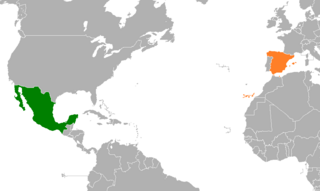
Ties between Mexico and Spain date back to the Spanish conquest of the Aztec Empire in 1519 and subsequent Spanish colonialism in the region which lasted until the end of the Mexican War of Independence in 1821. Formal diplomatic relations between both nations commenced in 1836 and were severed with the aftermath of the Spanish Civil War in 1939. Diplomatic relations were re-established in 1977 and have continued unabated since.

The nations of Jamaica and Mexico established diplomatic relations in 1966. Both nations are members of the Association of Caribbean States, Community of Latin American and Caribbean States, Organization of American States and the United Nations.

The nations of Mexico and Paraguay established diplomatic relations in 1831. Both countries are full members of the Community of Latin American and Caribbean States, Latin American Integration Association, Organization of American States, Organization of Ibero-American States and the United Nations.
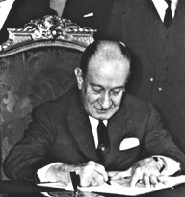
Manuel Tello Baurraud was a Mexican politician and diplomat, who represented his country at the League of Nations (1938–1941) and served twice as Secretary of Foreign Affairs; first in the cabinet of President Miguel Alemán Valdés (1951–52) and years later in the cabinet of Adolfo López Mateos (1958–64). In the interim, he served as ambassador of Mexico to the United States (1952–58).
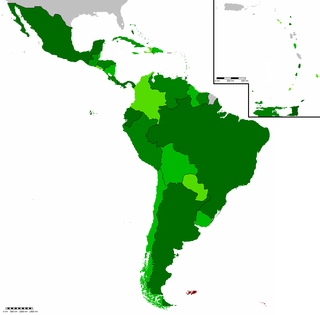
The Community of Latin American and Caribbean States (CELAC) is a bloc of Latin American and Caribbean states, consisting of 33 countries, and has five official working languages. It is seen as an alternative to the Organization of American States (OAS), and includes all OAS member states plus includes the nation of Cuba. Initially proposed on February 23, 2010, at the Rio Group–Caribbean Community Unity Summit, CELAC is seen as the successor of the Rio Group and the Latin American and Caribbean Summit on Integration and Development (CALC). CELAC was created to deepen Latin American integration and to reduce hegemony within the politics and economics of the region. The date of creation was on December 3, 2011, in Caracas, Venezuela, with the signing of the Declaration of Caracas.
The integration of Latin America has a history going back to Spanish American and Brazilian independence, when there was discussion of creating a regional state or confederation of Latin American nations to protect the area's newly won autonomy. After several projects failed, the issue was not taken up again until the late 19th century, but now centered on the issue of international trade and with a sense of Pan-Americanism, owing to the United States of America taking a leading role in the project. The idea of granting these organizations a primarily political purpose did not become prominent again until the post-World War II period, which saw both the start of the Cold War and a climate of international cooperation that led to the creation of institutions such as the United Nations. It would not be until the mid-20th century that uniquely Latin American organizations were created.

Mexico recognized and established diplomatic relations with the Sahrawi Arab Democratic Republic (SADR) in 1979.

The nations of Mexico and Venezuela established diplomatic relations in 1831, however, diplomatic relations between both nations have been historically unstable on several occasions. During the Venezuelan presidential crisis, Mexico took a neutral position and has continued to maintain diplomatic relations with the government of President Nicolás Maduro.
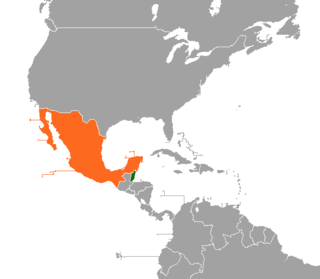
Belize and Mexico are neighboring nations. They established official diplomatic relations in 1981 after Belize obtained its independence. However, diplomatic relations between Mexico and British administered British Honduras existed as early as 1893. Relations between both nations are based on proximity, trade and cultural connections between the Maya peoples of Belize and southern Mexico.

The nations of Bolivia and Mexico established diplomatic relations in 1831. Both nations are members of the Community of Latin American and Caribbean States, Latin American Integration Association, Organization of American States, Organization of Ibero-American States and the United Nations.

The nations of Mexico and Saudi Arabia established diplomatic relations in 1952. Both nations are mutual members of the G-20 major economies and the United Nations.

Mexico does not officially recognize the State of Palestine; however, it has maintained contacts with Palestinian representatives since 1975. Both nations are members of UNESCO.
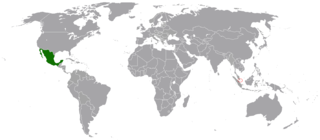
The nations of Mexico and Singapore established diplomatic relations in 1975. Both nations are members of the Asia-Pacific Economic Cooperation, Forum of East Asia–Latin America Cooperation and the United Nations.

Andrés Manuel López Obrador's tenure as the President of Mexico began with his inauguration on 1 December 2018. López Obrador, a member of the National Regeneration Movement (MORENA) and former Head of Government of the Federal District, had previously run for president in the 2006 and 2012 elections. He assumed office following a landslide victory in the 2018 presidential election. Upon his inauguration, he became the oldest person to hold the office since the change to a six-year term of office.

The nations of Ghana and Mexico established diplomatic relations in 1961. Both nations are members of the United Nations.

The Forum for the Progress and Integration of South America is an initiative by Sebastián Piñera and Iván Duque, for the creation of an integration body to replace the Union of South American Nations.

The nations of Equatorial Guinea and Mexico established diplomatic relations in 1975. Both nations are members of the Association of Academies of the Spanish Language, Organization of Ibero-American States and the United Nations.

The Presidency pro tempore of the Community of Latin American and Caribbean States is the office that represents the Community of Latin American and Caribbean States in international events.
Latin American and Caribbean Space Agency is an international space exploration organization based in Mexico, comprising several countries in Latin America and the Caribbean region. It was established in 2021 as part of the Latin American space race. According to its charter, its objective is to coordinate the space cooperation activities of Latin American and Caribbean countries for the peaceful use and exploration of outer space, the Moon and other celestial bodies.


















